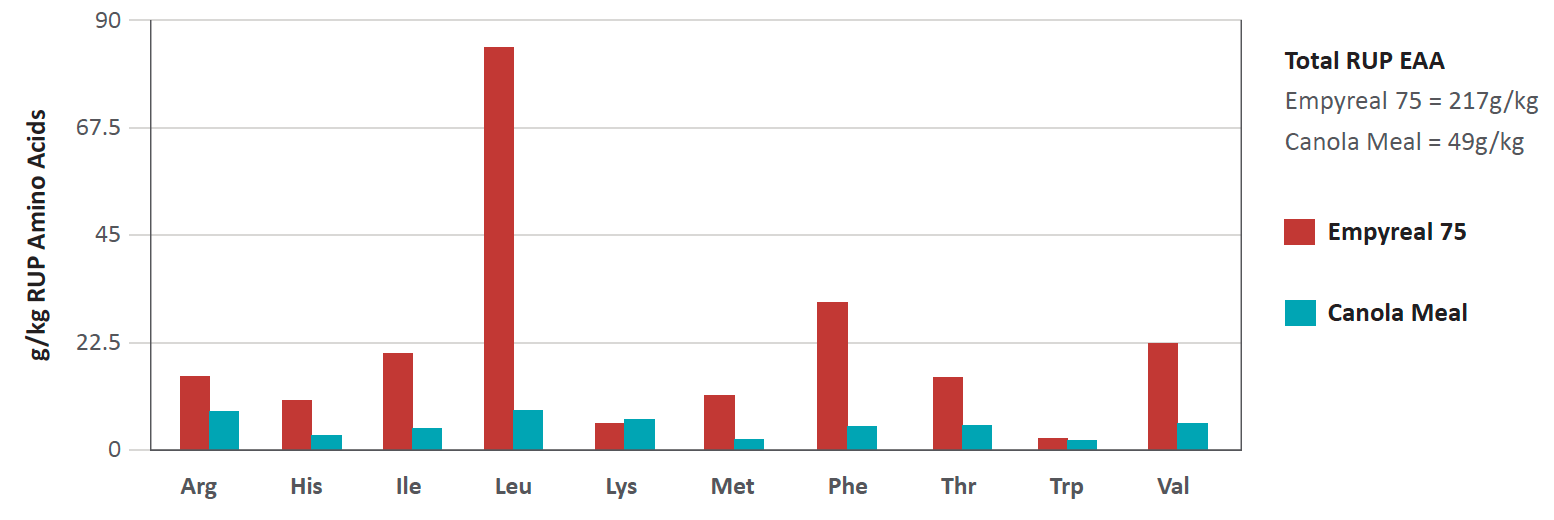Inclusion of Empyreal® 75 Corn Protein Concentrate in the Dairy Ration
Feeding the dairy cow is one of the highest costs associated with milk production. It is estimated that 40% to 60% of the cost of producing milk is associated with feed costs. In order to meet the cow’s daily nutrient requirements, as much as 16 to 18% of the cow’s ration should consist of protein, with 30% of that being rumen undegradable protein (RUP). Despite the rumen microbial population providing some of the rumen bypass protein, this is still not sufficient to meet the dairy cow’s nutrient requirement for maintenance, reproduction and milk components, including milk protein. Likewise, protein can be one of the most costly ingredients in the diet. Products such as Empyreal 75 can be an efficient and economical protein source to help optimize rations and milk production.
Unlike commodity ingredients, Empyreal 75 is the product produced from a process, not a byproduct produced as a result of process. This is uniquely different as, by definition, commodities may have broad discretion to meet byproduct specification when produced. In the manufacturing of Empyreal 75, tight specifications ensure that variations from lot to lot are kept to a minimum. This allows for customers to know what to expect, and can optimize their ration protein around Empyreal 75, as opposed to because of Empyreal 75. Empyreal 75 is a protein concentrate, with a minimum of 75% crude protein, 2% crude fat, and a maximum of 2.5% crude fiber and 1% starch. Based on in vitro RUP testing, Empyreal 75 would have approximately 67% RUP, making it a good ingredient to meet dairy cow dietary protein needs.
Essential amino acid composition of Empyreal 75 is shown in Table 1 in comparison to canola meal. Canola meal has been demonstrated to be a good source of protein in dairy rations, and meets recommendations of the 2.8–3.0 : 1, lysine: methionine ratio for these limiting amino acids in dairy diets. However, efficiency and ration optimization can be further enhanced, as canola meal has a relatively low RUP in comparison to Empyreal 75, at an estimated 67% RUP.
Table 1: Essential amino acid content on a protein basis of Empyreal 75 and canola meal
Figure 1: Comparison of RUP amino acid content of Empyreal 75 and canola meal
On a per-kg basis, Empyreal 75 would provide 217g/kg of essential amino acid RUP, compared to canola meal at 49g/kg (Figure 1). This would include a five-fold increase in bypass methionine, which is one of the first two limiting amino acids to the high-producing dairy cow. At assumed prices of $388.00/MT and $910/MT for canola meal and Empyreal 75, respectively, the cost per kg of bypass essential amino acids would be $8.56 and $4.61. This would be a 46% decrease in costs for this essential part of the dairy ration.
To optimize the RUP amino balance and capitalize on cost savings, Empyreal 75 can effectively be fed in combination with other supplemental protein sources, such as canola meal. Depending on the other ingredients in the diet, as much as 25% of the supplemental protein, such as Empyreal 75, can be fed in lieu of canola meal. On a protein basis, canola meal is priced at $994.87/MT. Replacement by Empyreal 75 can reduce that cost to $973.71/MT on protein basis. Additionally, due to the improved bypass characteristics of Empyreal 75, more of the right types of protein can bypass the rumen for even greater efficiency of amino acid utilization.
Cargill Branded Feed creates proprietary feed ingredients to improve digestive health and performance for production animals in the beef, dairy, aquaculture and pet food markets. Branded Feed is a segment of Cargill Starches, Sweeteners & Texturizers (CSST).


